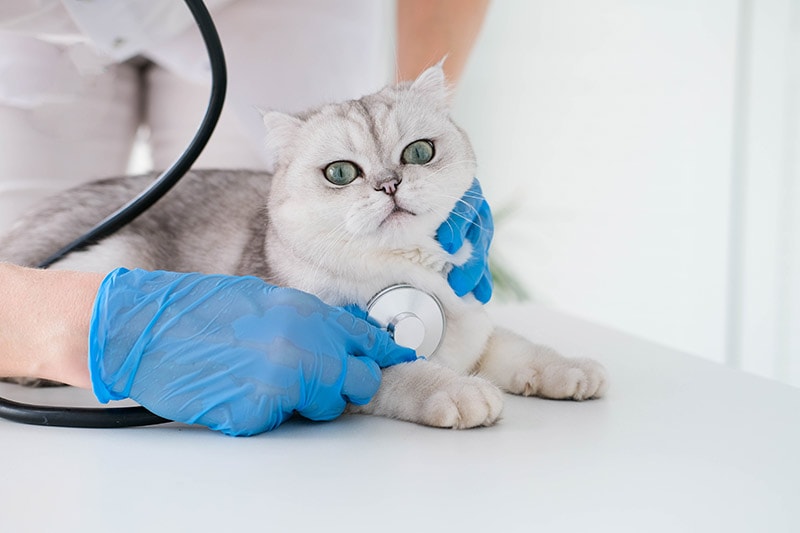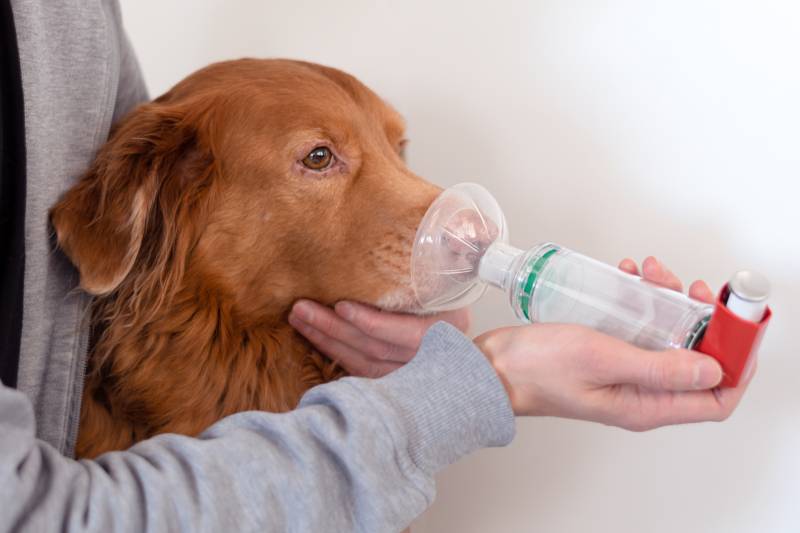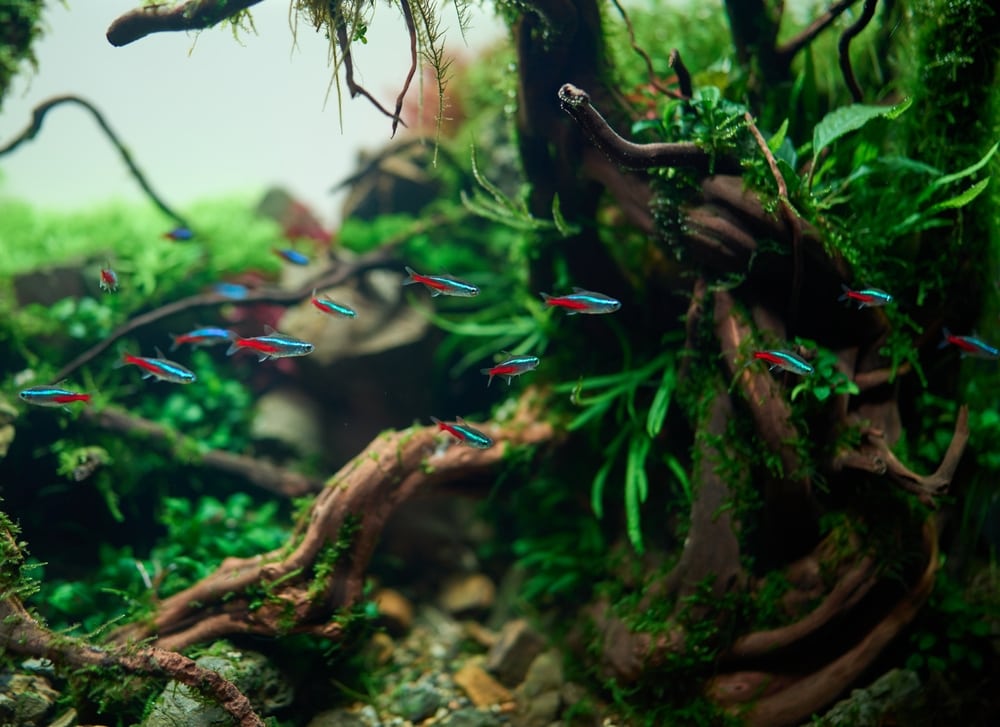20 Signs a Tortoise Is Dying or Very Sick: Our Vet Answers
Updated on

Click to Skip Ahead
Tortoises are well known for being long-lived, but just like any other animal, they can succumb to illness prematurely. Since it is difficult to assess a tortoise’s body and they aren’t known for readily communicating needs for much more than food, it can help to receive some guidance on how to tell if your tortoise is sick, especially dangerously so.
We’ve made just that guide for you so you can know when your tortoise needs to see a vet.
The 20 Signs a Tortoise Is Dying or Very Sick
1. Vocalizing
Tortoises have a very short list of sounds that they make, and vocalizations are rare in general. The most common sound you’ll hear is hissing if they are unhappy or stressed, and it is usually limited to specific moments. If a tortoise is hissing during what would normally be non-stressful interactions, that tells you something is wrong.
You can look for sources of pain and assess their environment for changes, such as in temperature, humidity, diet, or water, that might be stressing them. If this behavior persists, it is best to bring them to a veterinarian, as lab work or imaging may be required to find the cause.
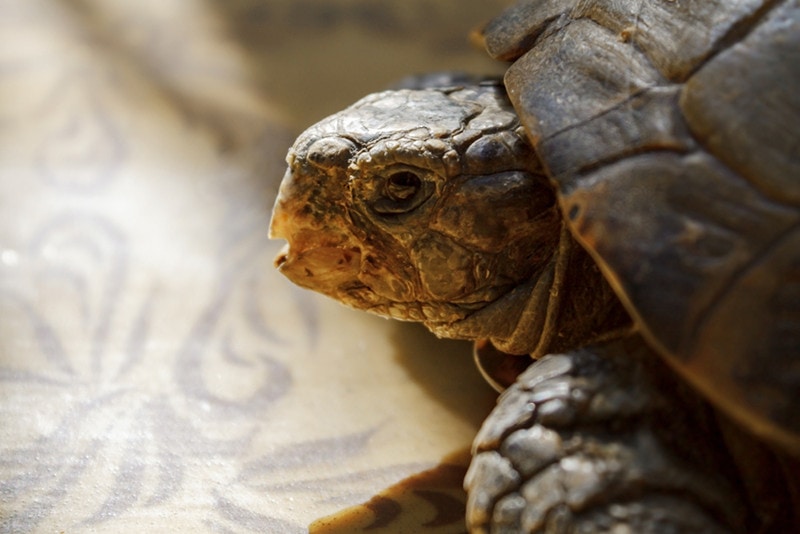
2. Personality Changes
Contrary to popular belief, a lot of pet tortoises pack a lot of personality under their shells. If your tortoise’s preferred behaviors change suddenly, that can be a clue that something is wrong. For outgoing tortoises, this might be hiding, lack of interest, biting, or other aggressive behaviors. For shy or under-socialized tortoises, if they’re suddenly seeking you out, it is worth questioning why and checking for problems.
3. Refusing to Come Out of Their Shell
Normal tortoise behavior includes staying mostly out of their shell; they will primarily use it to hide. While there are exceptions, like brumation, if a tortoise is spending considerable time tucked into their shell, that tells you they don’t feel well. The longer this lasts, the more serious the problem is, so it is best to have them checked by a veterinarian if you notice this is happening. If you cannot coax a tortoise out of their shell at all, this is an emergency, and they should be taken to the vet immediately.
4. Shell Changes
A tortoise’s shell is the part of their body that you can see easiest and most consistently. While it may appear to be an inert object, it has blood vessels, nerve endings, and important growth patterns. The shell should be hard throughout, and any soft spots are always a problem.
Cracks, breaks, or scutes that lift are always bad though the reasons can vary. Incomplete shell shedding can trap moisture beneath the shed leading to parasites and shell rot. Trauma to the shell can correspond to injuries below the shell as well.

5. Skin Lesions
Cuts, abrasions, bleeding, scabs, peeling skin, and more, if it would be abnormal on your skin, it is probably abnormal on your tortoise’s as well. Sometimes these are due to trauma; other times, parasites, nutritional deficiencies, and genetics can also be responsible. New skin changes should always be assessed by a veterinarian as soon as possible before infection can set in.
6. Lumps or Bumps
Cancerous growths, benign or malignant, are always a bad thing. A veterinarian can check the lump to determine the type, then decide what treatment is best, which may include something major like surgery. Some lumps may be an incidental finding in an otherwise normal tortoise, but that doesn’t mean they can’t develop into something life-threatening.
7. Abscesses
Abscesses are a specific type of lump, which are often seen externally but can, unfortunately, also develop internally. In humans, when an infection forms into an abscess, which is an encapsulated area that contains white blood cells and bacteria, there are enzymes that can break these down to resolve the abscess with time, especially with the help of antibiotics.
Tortoises (and other reptiles) lack this enzyme, and so abscesses that form will stay unless emptied and removed. To make the situation worse, while people will often have fluid-filled abscesses that are easy to drain, tortoise abscesses contain what we call caseous material, which has a thick, cottage cheese-like consistency and so usually cannot be emptied without being cut open.
Abscesses in certain locations can be a significant health concern for tortoises, so it is best they are brought to the attention of your veterinary team so they can remove them.

8. Parasites
Tortoise parasites can be internal or external and therefore cause different problems. Itching and discomfort, weight loss, decreased OR increased appetite, agitation, and lethargy are all possible signs of parasites. Tortoises should be assessed for fecal parasites as needed by their veterinarian, and if you note any external parasites or new skin lesions, always have your veterinarian check into this. Parasites can be treated with medication but often also require thorough cleaning of the tortoise’s environment.
9. Decreased Appetite
While tortoises don’t always eat every day, especially as they age, they should still have a consistent appetite and a willingness to eat their favorite treats when offered. Tortoises that refuse food are letting you know something is wrong. A check of their environment, especially of their enclosure temperatures, should be the first step you take after noticing your tortoise hasn’t been eating. If nothing is found there, then they need to see a veterinarian as there are many possible causes.
10. Decreased Drinking
Similar to decreased appetite, tortoises should be drinking regularly, and if they don’t do so for several days, something is definitely wrong. Tortoises should drink multiple times per day, so you may be able to catch this problem earlier than some others. In some cases, something else is wrong, causing the tortoise to be too tired or ill to want to put in the effort to move for water but will accept water that you offer them directly.
Other times, they will refuse any food or water, even if fresh and given to them where they are. This is an emergency, and the tortoise needs to be taken straight to the vet to assess for dehydration, rehydration as needed, and to find the cause.
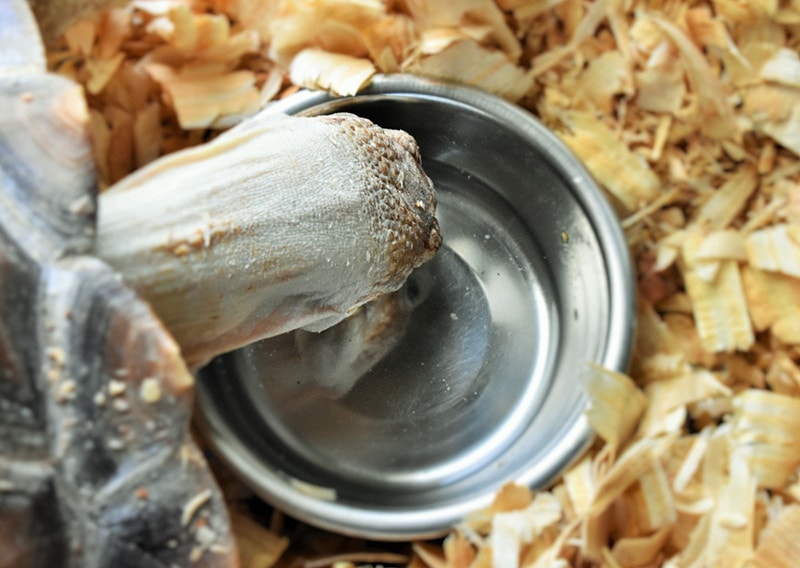
11. Hypothermia
Tortoises rely on the temperature around them to maintain their body temperature. If you touch your tortoise and note they feel much colder than usual, check the temperatures of their enclosure and the greater area they live within. Sometimes the problem is something like a heat bulb that has died, but sometimes the problem is the tortoise themselves. Cold tortoises will usually stop eating, drinking, or coming out of their shells, so it is crucial to catch this early and get them warmed up and given supportive care while hunting down the cause.
12. Lethargy
You’d be surprised to find tortoises are typically pretty active animals. They’re curious, food motivated, and will quick-step themselves all over your house or yard in pursuit of whatever has caught their interest. A tortoise acting like people think they do, sitting around and not moving, or moving very slowly is abnormal behavior.
Sometimes the problem is as simple as low environmental temperatures, but there are many more serious causes, too, including infections, nutritional deficiencies, parasites, cancer, and more. Always have a lethargic tortoise checked so they can receive the care they need to correct this.
13. Weight Loss
Weight loss is really tricky to see in tortoises. Since most of their body is within their shell, and limbs aren’t known for changing size with weight much, it can be hard to tell if a tortoise’s weight fluctuates. There are also seasonal and brumation-related weight changes that are normal.
Regularly weighing your tortoise (which might require a gram scale in small tortoises or a large dog scale in large tortoises) can help track their weight throughout the year to help you tell if something is wrong. In small tortoises that are handled daily, you may be able to note weight loss by how they feel when you pick them up, especially if the weight loss is sudden.
Many serious health conditions can cause weight loss in a tortoise, so they need to be checked for parasites and undergo diagnostic testing if they’re losing weight.
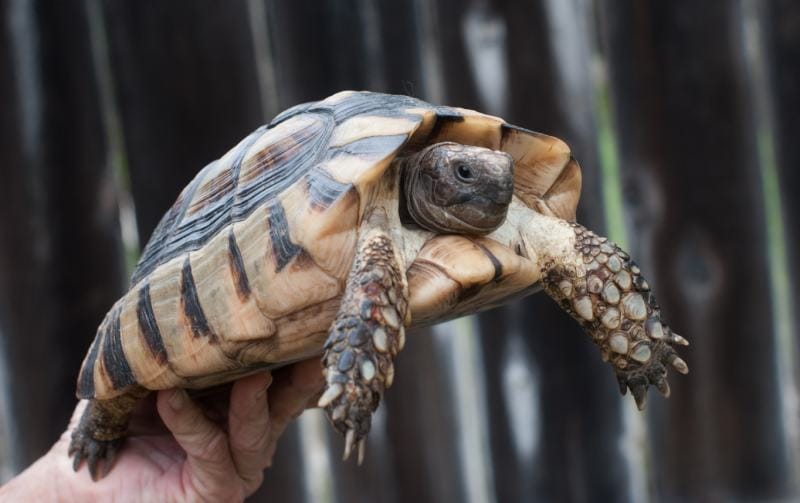
14. Sunken Eyes
Dehydration can also be tricky to see in a tortoise. They don’t have an abundance of visible skin, and most of what you can see is tight and thick skin that may not easily show signs of dehydration unless you know to check. One sign of significant dehydration (not early) is sunken eyes. If you realize this is happening with your tortoise, this is an emergency, as their eyes only sink after they have become significantly dehydrated to a dangerous level.
15. Eye or Nasal Discharge
Discharge from any part of a tortoise’s body is abnormal, but the most likely discharge you’ll readily see is discharge from the eyes or nose. Often mucoid and white or green in color, this is a sign of inflammation and also infection. Nasal discharge can be the first sign of a respiratory infection, which can be life-threatening. Tortoises that develop either eye or nasal discharge need to see their veterinarian for workup and medication.
16. Changes With the Mouth or Tongue
It may be hard to tell, but a tortoise should have a pink tongue and gums. If they become pale, this is a sign of serious illness. Tortoises are also often prone to infections in the mouth, known as rot, which can cause them to stop eating or drinking. Any growths in the mouth need to also be checked, so if you happen to regularly see inside your tortoise’s mouth and something is amiss, call your vet.
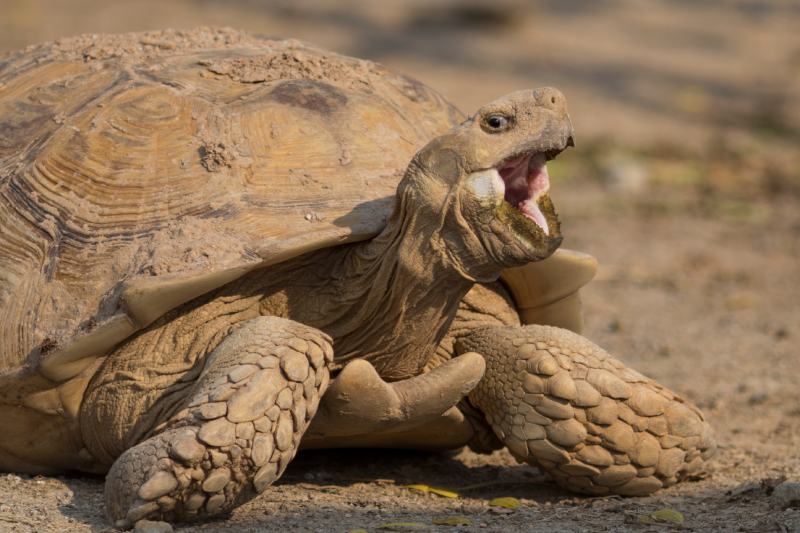
17. Urine Changes
Normal tortoise urine isn’t that dissimilar to ours, though they also excrete urates which will be watery to slightly thick white material seen with the urine. If their urine changes color, or if their urates are hard or gritty, they could be in organ failure, dehydrated, or even progressing to accumulating urates within the bladder, which can cause kidney damage or failure. When cleaning your tortoise’s enclosure, it is important to confirm the presence of urates but also that the consistency is correct.
18. Stool Changes
Tortoises can develop diarrhea or constipation, just like the rest of us. Similar to monitoring their urates, it is important to identify passed stool when cleaning a tortoise’s enclosure and monitor for objects in it, color changes, consistency changes, or changes in frequency or volume. Tortoises can develop GI obstructions which are an emergency, they can also stop eating if they’re constipated. Diarrhea may indicate parasites or infection is present so be sure to track your tortoise’s stool regularly.
19. Difficulty Breathing
This is always an emergency and a tortoise having trouble breathing should be taken to a veterinarian immediately. This may look like open-mouthed breathing, neck extension, gasping, and audible other sounds while trying to move air. Pneumonia is very dangerous for a tortoise but there are other possible causes too that need to be checked if this happens.
20. Paralysis
Severe infections in tortoises can spread throughout their body, leaving them unwilling or unable to walk from exhaustion, but can also affect the nerves in the back and leave them partially paralyzed. A tortoise that cannot move around is in extreme danger and needs care immediately.
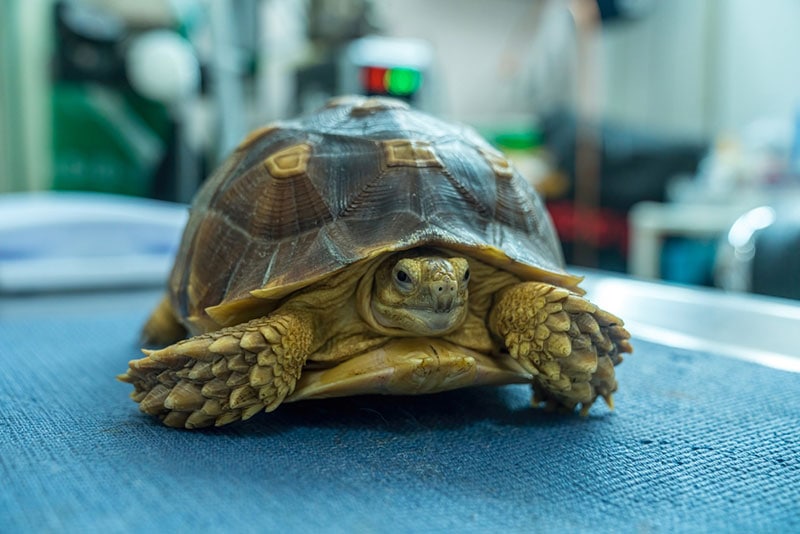
Brumation Versus Illness
Experienced tortoise owners may have noted while reading this article that many of the signs of severe illness in a tortoise could be normal if they are coming in or out of brumation or are currently undergoing the process. How can you tell the difference?
Brumation is a hibernation-like state that occurs in some reptiles, in which they handle the cold season with less movement and eating and enter a torporous, minimally responsive state.
Not all tortoises brumate. This is the first thing to know about your tortoise so you know whether to consider brumation as a potential cause of their signs. If they do brumate, brumation is seasonal in nature and they will behave similarly each year this happens. If you have had the chance to keep your tortoise for several years, you should be able to note differences, such as lethargy that onsets too suddenly, or isn’t paired with other brumation changes, or that this isn’t the right season.
When in doubt, you can have a veterinarian assess your tortoise to check which is the problem. For a tortoise that isn’t responding at all, you can flip them on their back, as they should try to correct themselves even if unsuccessfully, if they are alive and conscious. Remember that brumating tortoises are still minimally conscious so in an emergency you can use this to identify if a tortoise is brumating.
Conclusion
While it may at first appear as if tortoises are stoic creatures that are very hard to read, they do provide us with some consistent signs that they aren’t feeling well and may be dangerously ill. Always consult a veterinarian about any abnormal signs you notice in your tortoise and it is best to know where your closest veterinary clinic is that can treat a tortoise on any given day or time.
Featured Image Credit: TShaKopy, Shutterstock


